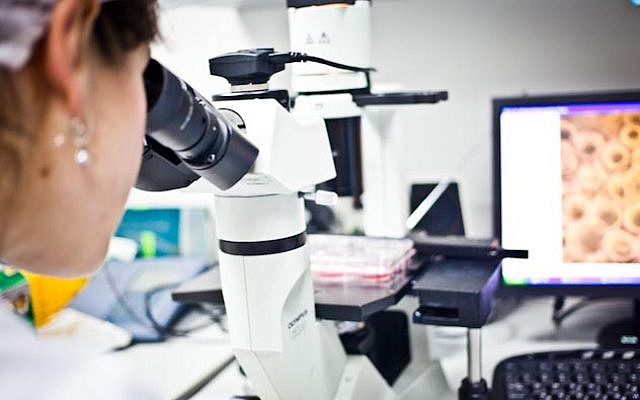
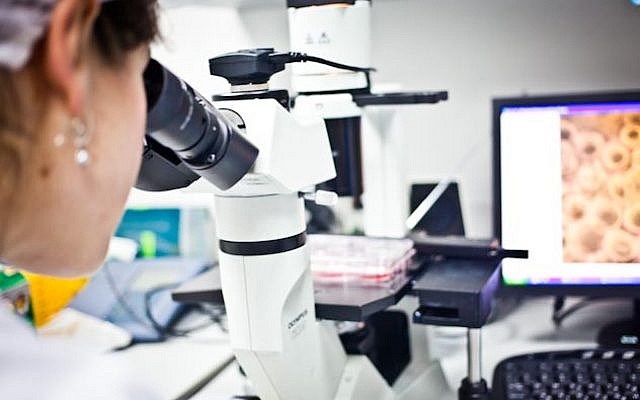
A researcher working in the lab of Kadimastem in Ness Ziona (Hagit Stavinsky)
Kadimastem Ltd., a biotechnology firm that develops cell therapies, said it has received “promising interim results” from a first group of patients treated with its new therapy for amyotrophic lateral sclerosis (ALS), also known as Lou Gehrig’s disease, a fatal neurodegenerative condition that causes the loss of muscle control.
“Looks like we are on the right track,” said Rami Epstein, the CEO of Kadimastem, in a phone interview. “The interim results are important because they demonstrate that we have managed to inject the live cells into a human body without any treatment-related significant adverse effect, while also showing a measurable therapeutic effect. Our cell therapy managed to significantly slow down the disease progression and halt deterioration of the disease.”
The cell therapy aims to slow or even halt the progression of the disease and improve patients’ quality of life and life expectancy, he said.
ALS leads to muscle weakness, loss of motor function, paralysis, breathing problems, and eventually death. The average life expectancy of ALS patients is two to five years. According to the ALS Therapy Development Institute, there are approximately 450,000 ALS patients worldwide, 30,000 of them in the US. According to the ALS Foundation for Life, the annual average healthcare costs of an ALS patient in the US are estimated at US$ 200,000. Thus, the annual healthcare costs of ALS patients in the US alone amount to $6 billion.
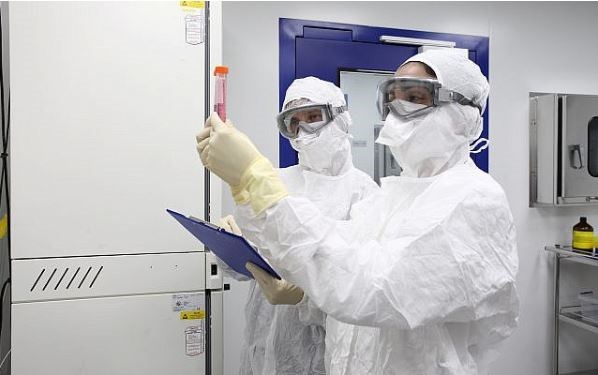
Reserachers at Kedimastem’s Good Manufacturing Practice (GMP)-compliant production facilities in Nes Ziona, Israel (Hagit Stavinsky)
In a filing to the Tel Aviv Stock Exchange last week, the firm said that the treatment administered to one group of patients in a Phase 1/2a clinical trial held in Israel apparently caused a significant slowdown in the progress of the disease and was found to be safe.
“ALS is a devastating disease and there is a critical need for new treatments to more effectively slow down or halt its rapid progression,” said Dr. Marc Gotkine of the Department of Neurology at Hadassah Medical Center, Jerusalem, and the principal investigator of the trial. “These preliminary results on a small subset of patients are encouraging, as the treatment seems to be safe, at this lower dose.”
The initial data analysis appears to demonstrate a slowing down of the reported deterioration rate over the three months following treatment, he said.
“This is a positive, but preliminary results and the final results should be awaited,” analysts Frost & Sullivan said in an investor note filed with the Tel Aviv Stock Exchange.
“Should the final results expected at the end of 2019 for this phase 1/2a trial also prove positive, this will position Kadimastem as a potential major player in the ALS market and will have positive effect also on firm’s value,” the analysts said. “This will also serve as proof of the potential of the company’s platform which can be used to treat additional indications in the future.”
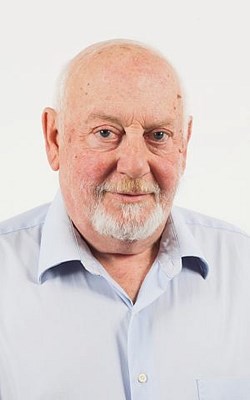
The company, whose shares are traded on the Tel Aviv Stock Exchange, was founded by Prof. Michel Revel, who serves as the company’s chief scientific officer. Revel is an emeritus faculty member of the Weizmann Institute of Science and a winner of the Israel Prize, the nation’s greatest accolade. He is also the creator of Rebif, a multiple sclerosis drug now marketed by Merck and selling for billions of euros globally.
Revel founded Kadimastem in 2009 with Yossi Ben-Yossef, based on cell therapy research Revel had conducted at the Weizmann Institute. Such research focuses on live cells transplanted into the body to replace malfunctioning, disease-causing cells.
“In the cell therapy methodology developed and implemented by Kadimastem, we take embryonic stem cells, expand them into large quantities, and differentiate them into specializing cells,” he said. “Our cells are injected into the patient, replacing and compensating for the biological activity of the damaged cells.”
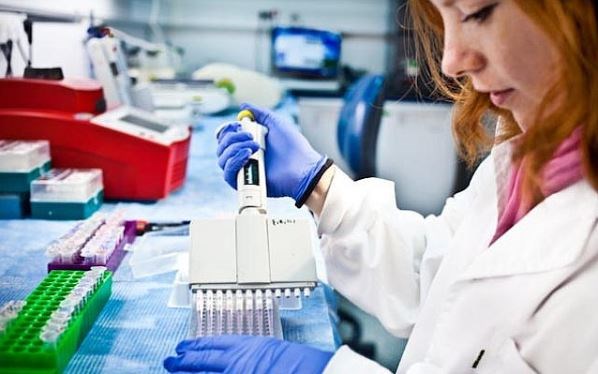
A researcher working in the lab of Kadimastem, in Nes Ziona, Israel (Hagit Stavinsky)
The firm operates in two main spheres: neurological diseases, with the aim of replacing nervous system cells that have stopped functioning; and type 1 diabetes, in which cells that secrete the insulin needed to absorb sugar stop functioning. “We develop cells that secrete insulin” and regulate blood sugar levels, he said.
In the neurological sphere, the firm has started clinical trials, still at very early stages and on a small group of patients, to replace astrocyte cells,which are responsible for supporting neurons that enable muscle activity. In ALS patients, as a result of dysfunctional astrocytes, the neurons degenerate and muscle control deteriorates as the disease progresses.
“All of the ALS patients die eventually,” said Epstein, as there is no known cure for the disease. “As the disease progresses, patients eventually lose control of their respiratory muscles, including the diaphragm, causing severe respiratory complications, the most common cause of death for ALS patients.”
In their work at Kadimastem, the researchers “differentiated” embryonic stem cells into astrocytes. Scientific literature has indicated that astrocyte cells play a substantial role in supporting malfunctioning cells in ALS and other neurodegenerative diseases, said Revel in a statement issued by the firm.
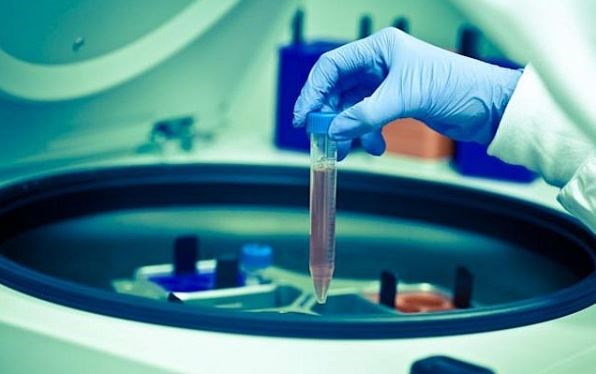
Kadimastem’s lab in Nes Ziona, Israel (Hagit Stavinsky)
The patients had these cells injected into their spinal cord, where they secreted various factors that act as “goodies,” said Epstein. In animal trials, these cells created a protective layer around damaged neurons preventing further deterioration and maintaining and supporting the remaining neuron and muscle activity.
The cells were also able to secrete factors that remove toxic materials accumulated on the damaged neurons, thus acting as a “garbage truck,” taking toxic and damaging materials away from the neurons, Epstein said.
Now, the Phase 1/2a clinical trial conducted in humans “is the first one ever, worldwide, in which live astrocyte cells, our own proprietary AstroRx cells, have been transplanted into humans,” he said.
The trial, which started last year, is being conducted at the Hadassah Ein Kerem Medical Center in Jerusalem on 21 patients divided into four groups.
“Each group receives our AstroRx cells,” Epstein explained, saying the firm is very excited about the interim results of the first group, which got the lowest dose of the cells — some 100 million cells injected into the spinal cord fluid of each patient.
The results are “very significant for ALS patients and for us,” he said. “We hope that in the other groups we will see improved or prolonged efficacy and also safety. Kadimastem has advanced the quest to find a treatment for ALS but has also shown that the company has the ability to differentiate cells into clinical grade functional cells, fit for injection and also effective in humans.”
A second cohort of patients, forming part of the same ongoing Phase 1/2a clinical trial, will be getting 250 million cells; group three will get two doses of 250 million cells each, to see if repeated treatments will yield enhanced results; and the fourth group is expected to receive a dose of 500 million AstroRx cells.
The journey ahead is still very long, Epstein emphasized, and it will be years before a drug will be made available to patients. The current Phase 1/2a trial is expected to conclude at the end of 2020, and then an additional trial will start, hopefully with a larger group of patients and in a number of medical centers.
Shares of the company have declined 2.1% in the past 12 months, bringing its market value to NIS 74 million ($21.2 million), as of end of day Wednesday.
